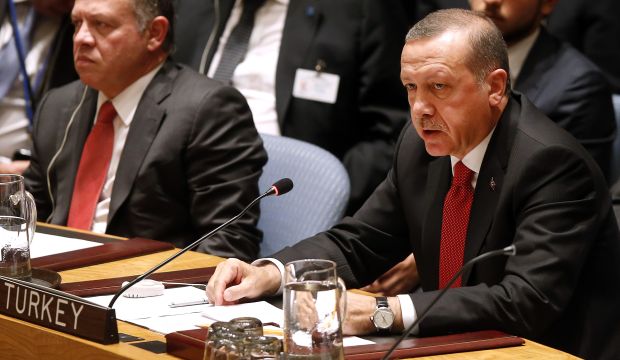
President Recep Tayyib Erdoğan of Turkey (R) addresses a meeting of the UN Security Council regarding the threat of foreign terrorist fighters, in New York City, New York, USA, on September 24, 2014. (AP Photo/Jason DeCrow)
Beirut, Asharq Al-Awsat—Turkey is to discuss providing support to the US-led coalition against the Islamic State of Iraq and Syria (ISIS), President Recep Tayyip Erdoğan said on Wednesday, at the same time that official sources have told Asharq Al-Awsat that any involvement by Turkey would be dependent on the alliance clarifying its position on the Assad regime.
Before his speech at the UN General Assembly in New York on Wednesday, Erdoğan said he would discuss with his cabinet how Turkey could assist the coalition against ISIS once he returned to Ankara. Asked about what form this support would take, he answered: “It would encompass all forms of military and political [support].”
Erdoğan also referred to ISIS as a terrorist organization for the first time, when speaking of Ankara’s general position toward the strikes: “Of course we see this step, which targets the locations of this terrorist organization in the region, as a positive one.”
Meanwhile, in Ankara, Deputy Prime Minister Yalçın Akdoğan said Turkey had always been supportive of any cooperative action against terrorism, and hit out at media outlets which have published reports that Ankara has been cooperating and supporting ISIS.
Speaking of the nature of Turkey’s involvement in the coalition, he said: “Military cooperation can take a number of forms, not just direct involvement in military operations.”
Speaking on condition of anonymity, officials told Asharq Al-Awsat the Turkish government would be putting a motion before parliament on Thursday for Turkey to become involved in military action in Syria and Iraq “in order to protect national security.”
Another source said a series of meetings will be held next week involving government and military officials to flesh out Ankara’s official strategy and position toward ISIS.
But there have been other, conflicting reports regarding the kind of support Ankara could provide to the coalition.
At the same time that sources within the office of Prime Minister Ahmet Davutoğlu told Asharq Al-Awsat that Turkey would not be allowing the coalition to use its “airspace or the Incirlik Air Base in northern Turkey to carry out strikes,” other official sources said Ankara would be reevaluating its “conservative position” regarding the use of its airspace once Erdoğan returned from New York.
One source close to President Erdoğan, who requested anonymity because he was not authorized to brief the media, told Asharq Al-Awsat it was “unlikely that Turkey, its airspace, or the Incirlik Air Base would be used by coalition forces.”
“Turkey has some basic concerns about the coalition plan against ISIS. First, its lack of clarity and the clarity of its final goals; second, the danger of casualties resulting from the strikes, which have not been studied properly and which could pose a danger to our national security,” the source said.
“Ankara wants guarantees that these strikes will not work in Assad’s favor,” he added, also expressing Turkish concerns that the military aid being provided to the Kurdistan region may find its way into the hands of other “terrorist” organizations on Turkish territory, particularly the Kurdistan Workers’ Party (PKK).
“The PKK is looking to establish itself as a member of the coalition against ISIS, and its getting hold of any weapons constitutes a grave danger to our national security,” the source said.
“We have paid the price with 40,000 deaths,” the source added, in reference to the number of people Turkey alleges the PKK has killed since 1982.
